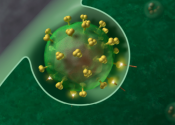Herpes virus found to promote chronic deterioration of the immune system
A research team at the University of Córdoba is studying the alterations that occur in the immune system's T lymphocytes with respect to age and in relation to the cytomegalovirus herpesvirus.
Nov 29, 2021
0
137








